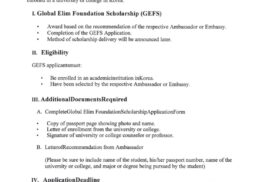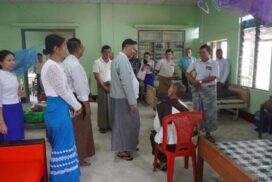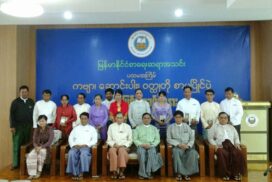By Maung Hlaing
“ရာဇဝင်ကို ချွေးနှင့်ရေးရမည်ဆိုတော့ ငန်ငြိငြိနေတာပေါ့။ ထို့ကြောင့် ဂျပန်တို့ လက်ထက် တွင် ဗမာတတွေ ကမ္ဘာမကျေအောင်ရသော လွတ်လပ်ရေး၏ အရသာမှာ ငဘအဖို့ ငန်ငြိငြိဖြစ်လေသည်။ အကြောင်းကိုဆိုသော် ချွေးတပ်သားအတွက် ဝါးကွပ်ပျစ်တန်းလျားပေါ်တွင် မနပ်ဘဲနှင့် ပြဲနေ သော ထမင်းပုံကြီးဘေး၌ ဖုန်မှုန့်ရောသော ငါးပိတုံးများမှာ ဆားပွင့်၍နေလေရာ ခွေးမှပင် မစားသော အစာကို မနေသာ၍ ဆာဆာနှင့်စားလိုက်တိုင်း ပါးစပ်ထဲတွင် ဆားခု၍နေသောကြောင့် ဖြစ်လေ သည်။” (a short excerpt from ‘ငဘ’ by မောင်ထင်, published in 1991.)
Its original translation is: — “People say that history is written in sweat: if so, will not history have a salty taste? The taste of freedom Myanmars obtained under the Japanese ‘to endure till doom’s day’ at least is salty to Nga Ba’s taste. The reason is this. The Sweat Force is fed rice, over-boiled yet not properly cooked. This messy rice is heaped on the bamboo flooring to be eaten by the sweat Force. By the side of heaps of rice are lumps of dried-up fish paste smeared with dirt. Salt in the fish had already crystallized. Even dogs disdain to eat such a mess. Nga Ba driven by hunger, gulps it down. The salt crystals leave a salty taste in Nga Ba’s mouth.” (a short excerpt from ‘Nga Ba’ by Maung Htin, published in 1991.)
Sayagyi Maung Htin deserved such highest literary award
as he was well-efficient and well-read in both Myanmar and English literature. He wrote novels, plays (Pyazat), poems, essays, travelogues, science fiction, articles on research and social affairs, criticism and so on. Although we cannot say that all of his works are classic, literary critics say that most of his novels are classic.
Please have a taste of this excerpt. As for me, it gives me a taste for reading satire. I strongly believe that if one reads it, one cannot help singing the praises of Sayagyi Maung Htin’s style of writing on satire. Some say that the works of Maung Htin are satire. Others assume that he was a highly gifted writer who could vividly depict the life of people from all social strata struggling from womb to tomb. However, he presented the natures of his characters satirically. It is true. In his Introduction to “Varieties of Thoughts” Saya Maung Htin frankly confess, “I’m very fond of satire in English Literature and Yagan in Myanmar Literature. That’s why most of my works are influenced by satiric outlook.” That was why he translated ‘Gulliver’s Travels’ which was assumed to be the greatest work of satire in the English language. Because of his masterly translation into Myanmar, the book became the winner of the National Literary Award in 1981. Saya Maung Htin, indeed, was a rare writer who wrote what he spoke.
“Hey guy…read at least a book a day. If you do so, you may live a longer life. But if you fail to do so, you may live a shorter life. Without reading, although you may live a longer life, your life will be as dead as a doornail.”
He said so on 23 December 2003 when he was presented the National Lifetime Award for Literary Achievement. He received the award at the age of 93. In accordance with what he spoke, he devoted all his efforts to the literary arena and immersed himself in reading and writing up to the age of 97.
Actually, the National Lifetime Award for Literary Achievement is the highest literary award in the modern history of Myanmar’s literary world. It is presented in recognition of the lifetime outstanding and excellent performance of a man of letters (veteran writer or literary scholar) who has contributed much to the development of Myanmar literature.
Sayagyi Maung Htin deserved such highest literary award as he was well-efficient and well-read in both Myanmar and English literature. He wrote novels, plays (Pyazat), poems, essays, travelogues, science fiction, articles on research and social affairs, criticism and so on. Although we cannot say that all of his works are classic, literary critics say that most of his novels are classic.
Saya Maung Htin was born to landowner U Tayaung and Daw Sein Pwint in Labutta, Ayeyawady Region on 21 March 1909. His real name was U Htin Fatt. Besides his penname ‘Maung Htin’, he used such names as ‘Htin Fatt’, ‘LHF’, ‘HF’, ‘Po Tay’ and ‘Nga Ba’ for his literary works. He pursued his primary education at Saya U Khant’s Myanmar Vernacular school and at Saya U Po Tun’s Myanmar Vernacular school in Labutta.
He continued his studies at the Anglo-Myanmar Vernacular Middle School in Myaungmya in 1920. In that year, the national movement, which was also known as the ‘Students’ Boycott’ in the history of Myanmar, emerged. Consequently, when the National High School was established in Myaungmya, he continued to pursue a middle school education at that school.
Then, he moved to Yangon and continued his studies at the Myoma High School from 1923 to 1926 and passed the High School Final Examination.
Afterwards, he joined Rangoon University (now Yangon University) and took science combination but he was not eligible for the medical institute. So, he took English literature and Myanmar literature with a combination of oriental history. He obtained a BA degree with a Gold Medal in Myanmar literature in 1933.
In 1935, Saya Maung Htin served as a Senior Assistant Teacher at the National High School in Myaungmya. Then he changed his career in teaching and served as Township Executive Officer in Ayeyawady and Rakhine Divisions (now Ayeyawady Region and Rakhine State) between 1936 and 1942.
World War II forced him to come back to his native town Labutta. When the Peace Preservation Committee was formed in Labutta in 1942-43, he, while serving as a Township Officer under the committee, organized recruits for the Burma Independence Army (BIA).
In 1943, he served as Assistant Secretary at the Ministry of Foreign Affairs. Again, he was appointed as Deputy Secretary of the News and Information Department up to 1945. During the CAS (B) period, he was transferred to the (Burma) Broadcasting Service under the Ministry of Information in 1946-47 to serve as the Director.
While he was serving as Director of the Information Department in 1948-49, he also had to serve as Commissioner of the Rehabilitation and Resettlement Department for Rakhine Division (now Region). After resigning from the Information Department, Saya Maung Htin worked as an Executive Editor for the ‘Rangoon Daily’ (ရန်ကုန်နေ့စဉ်သတင်းစာ) from 1950 to 1955.
The life of Saya Maung Htin was quite interesting. Although he was on the move until he resigned from the government service, he performed his duties with professionalism while he was in service. And, at the same time, he could produce various kinds of literary works (masterpieces) including classic novels.
The activities that he carried out for the improvement of the literary world of Myanmar were many and varied. He led the first Myanmar journalists’ delegation to Japan in 1952 and to Paris and London in 1954. On behalf of the Myanmar Writers Association, he attended the 20th ceremony for Lu Xun’s memorial held in Beijing, the People’s Republic of China, in 1956. As the head of the Myanmar delegation, Saya Maung Htin attended the Conference on Book Publishing held in Colombo, Sri Lanka in 1961.
The tasks Sayagyi undertook for the development of Myanmar literature were gigantic. From 1955 to 1958, he worked as a consultant in compiling the Sarpay Beikman Encyclopaedia. Although he had retired from government service, he served as a freelance journalist for the ‘London Time’ from 1954 to 1977. Saya Maung Htin was elected as Chairman of the Myanmar Naing-Ngan Writers Association in 1954 and became Chairman of the Myanmar Naing-Ngan Journalists Association in 1959.
While he was writing novels and articles in various magazines, he gave a helping hand in Pitaka Translation works. That was why he was appointed as an editor for the Pitaka Translation works. In 1987, Saya Maung Htin was appointed to the Myanmar Language Commission and worked as a member of the Committee for Compiling Authentic Facts on Myanmar History of the State Law and Order Restoration Council.
Sayagyi began to write in the ‘Wun-tha Yuwa’ magazine, using the penname of ‘Maung Htin Fatt’ while he was studying at Myoma High School. As for English articles, he began to write an article for the Rangoon University Annual Magazine (1932-33). He used the penname ‘Maung Htin’ for the magazine. In combination with U Nyo Mya (mostly known as Oway U Nyo Mya), Saya Maung Htin wrote ‘Mi Chaw’ play (Pyazat) in the ‘Oway Journal’ of January 1936 issue and a bit of satire on the political situation of those days. Under the penname of ‘Po Tay’, he wrote ‘Kyon-lay Bon-pway’ episode in a series in the ‘Hanthawady’ newspaper from 1949 to 1969. He wrote over 300 poems and articles including translated and self-style works and 45 books. The first published book of Saya Maung Htin was a collection of short stories titled ‘Ko Daung’ that appeared in 1937. He won the National Literary Award for his translated book ‘Gulliver’s Travels’ in 1981. He became the recipient of the Lifetime Literary Award Founded by Pakokku U Ohn Pe in 1994. In 2003, the State conferred the ‘Medal of Outstanding Performance in Arts (First Class)’ on him.
Among the 49 books written by Saya Maung Htin, ‘Nga Ba’, a Myanmar self-style classic, has been published many times as it has been appreciated by readers. Besides, it has been translated into Chinese, Indian, Japanese and Russian languages and published in these countries.
Sayagyi was professionally qualified to be a writer, a literary scholar or a researcher. Apart from writing novels, he compiled ‘Reference Books on World Literature’ for the benefit of posterity. These works were histories of literature of Arab, China, India, Iran, Japan, Hebrew, Greece, Rome, Britain, America and France, translated from English to Myanmar. These books are literary heritage beneficial not only to scholars and researchers but also to new up-and-coming generations who are to go in for world literature.
Before I conclude, may I reproduce the eulogy and criticism mentioned by well-known literary critics?
“Maung Htin is like a puppeteer when he creates the movement of his characters. A puppeteer has to move, shake and control his puppets when he performs with them. He also has to sing, cry and talk. Then the puppeteer’s style becomes vivid…” (Writer and critic Dagon Taya).
“The works of Maung Htin are satire. That is why he is regarded in the literary world as a satirist. Indeed, it will not be wrong to say that Maung Htin alone is able to produce the works of satire in the literary world of Myanmar…” (Literary critic Maung Swan Yi).
Such a person who was well-efficient, well-read and well-thought-of in both government and literary circles was none other than ‘Maing Htin’.
Sayagyi Maung Htin earned his peaceful rest on 29 January 2006 at the age of 97. U Htin Fatt is dead. But ‘Maung Htin’ is still alive. As long as his satiric works are produced again and again throughout the successive eras, the nom de plume ‘Maung Htin’ will never … never disappear from the Myanmar literary world.
Because of his outstanding, performance, the title of ‘Sithu’ was conferred on him posthumously in 2012.
In the last episode of ‘Ko Daung’, Sayagyi satirically wrote ‘Ko Daung is dead. Long live Ko Daung!’
Likewise, may I exclaim that … “U Htin Fatt is dead. Long Live Maung Htin!”
Reference:
(1) အမျိုးသားစာပေတစ်သက်တာဆု စာပေပညာရှင်များ၏ စာပေနှင့် ဘဝအကြောင်း တစ်စေ့တစ်စောင်း (၂၀၀၁-၂၀၁၃)၊ စာပေဗိမာန်၊ ၂၀၂၁
(2) ငဘ၊ မောင်ထင်၊ သတင်းနှင့်စာနယ်ဇင်းလုပ်ငန်း၊ ပြန်ကြားရေးဝန်ကြီးဌာန၊ ဧကာဒသမအကြိမ်၊ ၁၉၉၁။
(3) NGA BA, by Maung Htin, News and Periodicals Enterprise, First Printing, 1991.
(4) Through the Window of Sarpay Beikman, by Maung Swe Ngae, First Printing, 2021.
Note: –
The author of this article joined the Sarpay Beikman in 1980 and worked as Assistant Editor, Editor and Chief Editor. Although he retired in 2007, he is still working for Sarpay Beikman by participating in literary teams organized by the State.














